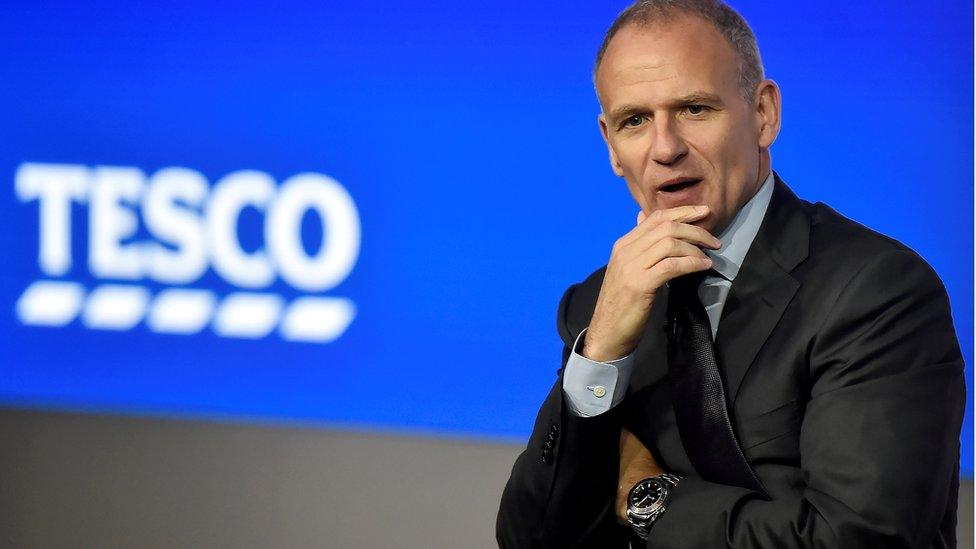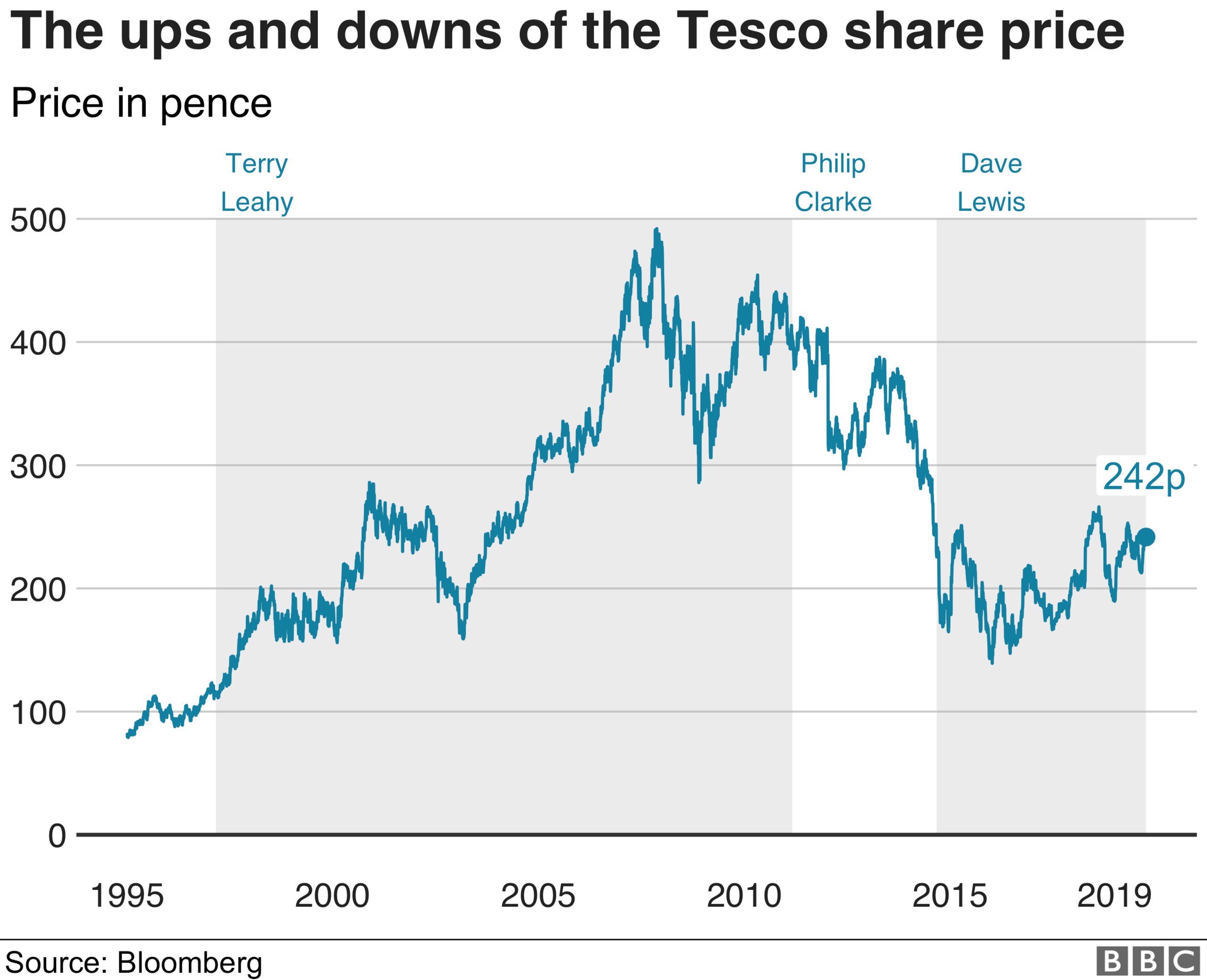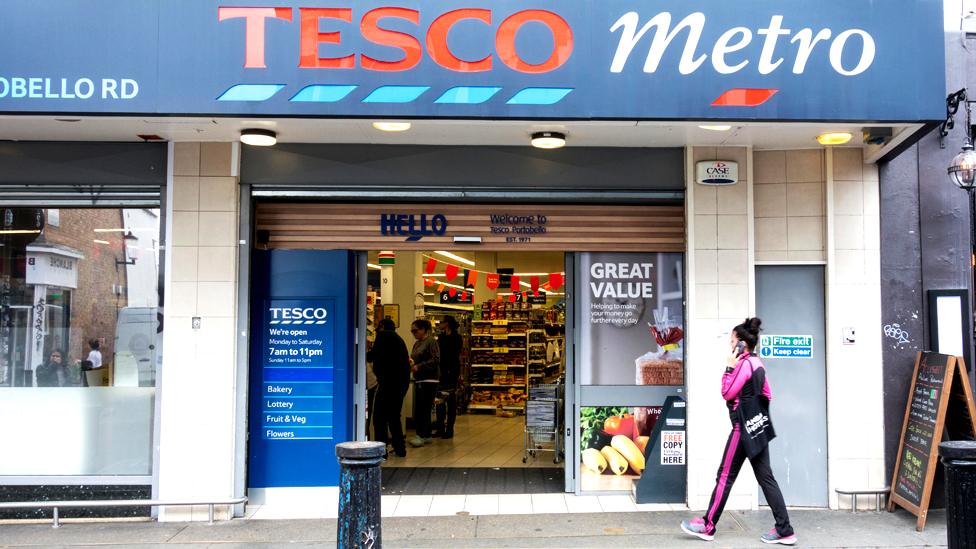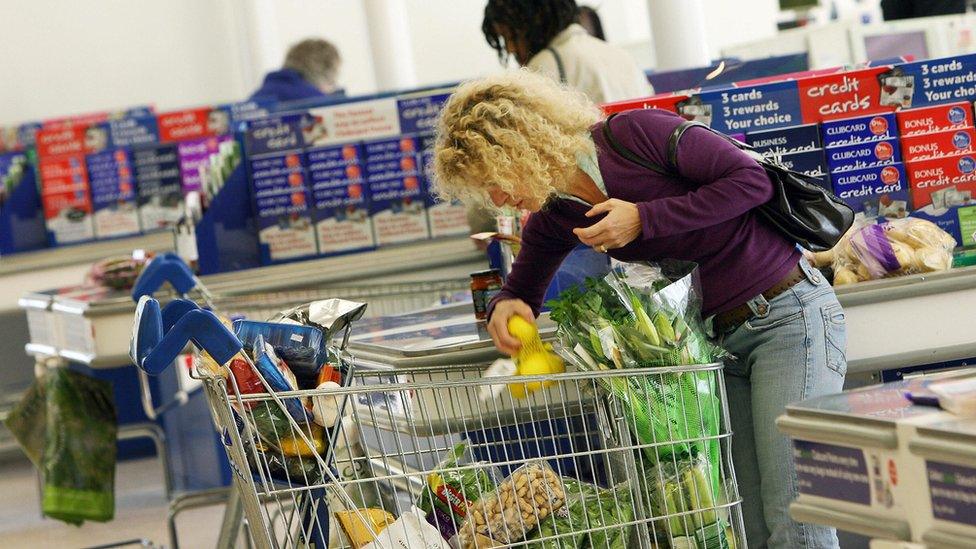Tesco boss Dave Lewis in shock departure
- Published

Tesco's chief executive Dave Lewis is to leave next year after leading a turnaround plan for Britain's biggest supermarket chain.
In a move that surprised analysts, Mr Lewis - who took the helm in 2014 - said the decision was "personal".
Ken Murphy, who has held senior positions at the owner of chemist chain Boots, will replace him.
The departure was announced as Tesco reported a 6.7% rise in first-half profits to £494m.
Tesco chairman John Allan said he had accepted Mr Lewis' resignation with "regret" and said the chief executive intended to leave "in the summer of 2020".
Mr Lewis said: "I believe the tenure of a chief executive should be a finite one and that now is the right time to pass the baton. The turnaround is complete, we have delivered all the metrics we set ourselves."
The 54-year-old added: "I am going to take some proper time out, recharge the batteries and think about what comes next."
Analysts at Shore Capital said he was "the bloke that saved Tesco".
He took the helm at a tumultuous time for the supermarket group, announcing shortly after he took over in 2014 that the retailer had been overstating its profits.
The company subsequently revealed a loss of £6.4bn, the biggest-ever suffered by a UK retailer
Since then Mr Lewis has set about reducing costs, with the latest of round job cuts announced in August when it said 4,500 staff in 153 Tesco Metro stores would lose their roles.
He also took on the discounters Aldi and Lidl by opening Jacks, Tesco's own discount chain.
'Total surprise'
Mr Lewis also orchestrated Tesco's 2017 takeover of Booker, the biggest food wholesaler, in a £3.7bn deal to create the "UK's leading food business".
Bernstein analyst Bruno Monteyne told BBC Radio 4's Today programme that there had been speculation about Mr Lewis' future after that deal as Booker's chief executive Charles Wilson had joined at the time.
"We're all trying to grapple exactly about the timing right now," said Mr Monteyne. His departure now was "a total surprise", he said.
Mr Lewis had joined five years ago "at a very difficult moment" for Tesco, Mr Monteyne said.
"Not only had it lost the trust of the customers, losing material market to the discounters, it ended up with an accounting fraud... internal morale broken. He really took over a broken company, and from being the most profitable retailer in Europe, suddenly had losses for the first time ever."


As with comedy, timing is everything in big business. Many chief executives overstay their welcome, failing to realise that the clock is always ticking; the average tenure of a FTSE 350 chief executive is 4.5 years, and coming down.
Dave Lewis, however, is clever enough to know that it's best to leave while the going is good.
He joined Tesco when it was in disarray and at a time of some drama. There had been a string of profits warnings, a boardroom bust-up leading to the departure of the chief executive and a nasty accounting scandal.
Mr Lewis moved quickly and the returns show in today's half-year results, which were rather overshadowed by Mr Lewis's departure. Sales were flat, but the operating margin hit 4%, a year before Mr Lewis said it would.
That is an achievement but Mr Lewis will know that running Tesco will not get any easier. Keeping Tesco at that level of operating margin is going to be a long, hard slog.
There will inevitably be speculation that he will return to Unilever, the Anglo-Dutch consumer goods giant where he worked before joining Tesco.

The shares initially dipped but were trading nearly 2% higher at 243p as the results for the six months to 24 August were better than expected.
Operating profit, excluding one-off items, rose by 25% at £1.4bn.
Like-for-like sales, which strip out revenue from new stores opened during the six months, rose 0.1% in the UK and Ireland.
At a group level, including operations in central Europe, notably Poland, and Asia, same store sales fell 0.4%.

Ken Murphy will have a £1.35m salary
When Mr Lewis joined Tesco from household goods company Unilever he was the first outsider to run the supermarket chain.
Speculation will turn to what he will do next, but Mr Lewis said: "I'm going to step back and have a think about what I want to do next with my family. I'm 54 years old and I'm going to sit back and think where I can make the best contribution."
His successor, Mr Murphy, has also been hired from outside after a lengthy career with Boots, which is now part of Walgreens Boots Alliance.
The 52 year-old graduated from University College Cork and was educated at the Christian Brothers College.

The Irishman left Walgreens Boots Alliance in January 2019 when his last role was chief commercial officer, president of global brands. He remains as a consultant.
But he held a wide-range of roles, including a two year period as chief operating officer of Boots until October 2013.
At Tesco, his salary will be £1.35m salary before bonuses, and his joining date has not yet been confirmed.
In-tray
"We would imagine that Mr Lewis may have been familiar with his replacement from his Unilever personal care days," said analysts at Shore Capital. "Mr Murphy has big shoes to fill."
They expect continuity for now but when Mr Murphy does take the helm he will face a number of challenges:
Deciding whether Jacks is an effective way to take on Lidl and Aldi
Assessing any long-term impact of Brexit on its supply chain
Adapting to the changing shopping habits of consumers
Considering the extent of the group's international business
Mr Allen described Mr Murphy as "growth-orientated seasoned business leader" and said he had been been looking for "experience, proven leadership in international retail businesses, a strong strategic mind"
In preparation for Brexit, Tesco said it was increasing its stock of long-life shelf products and noted that the UK imports about 50% of fresh food it needs.
- Published2 October 2019
- Published5 August 2019

- Published19 July 2019
